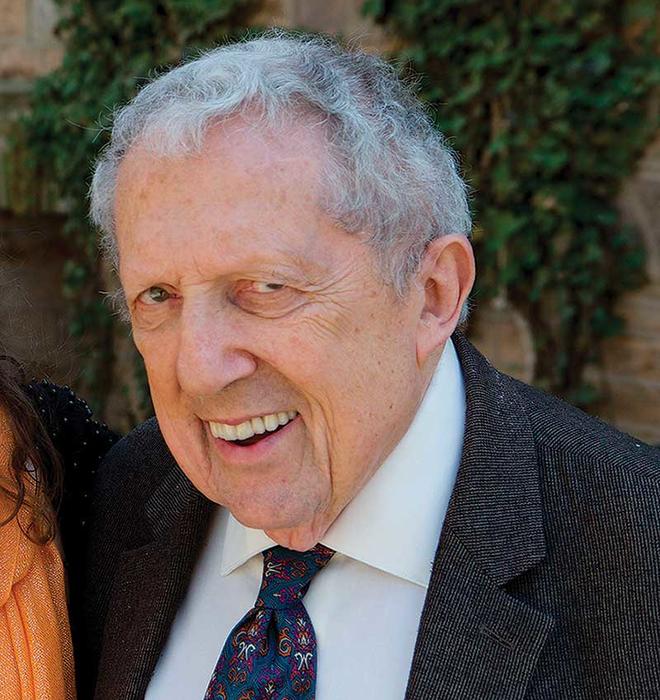
The long-neglected Jewish cemetery on Okopowa Street in Warsaw, Poland, was an overgrown jungle by 2003, when Emile Karafiol ’55 went looking for the graves of his ancestors. As Karafiol and his son struggled to navigate the 83-acre expanse, an idea was born.
Back home in Chicago, Karafiol, an academic historian turned corporate lawyer, launched what eventually became known as the Foundation for Documentation of Jewish Cemeteries, a searchable online database that today contains photographs, transcriptions, and location information for nearly 100,000 gravestones in cemeteries throughout Poland.
Over the years, Karafiol invested perhaps $100,000 in the project, making repeated trips back to Poland to help guide the volunteers who carried out work on the ground. Although he was a resolutely secular Jew, he felt that “the condition of the cemetery was profoundly dishonoring to the people there,” says his son, Paul J. Karafiol, known as P.J. The project “was a way to honor them and just sort of say, ‘You know, this community existed.’”
Emile Karafiol began life as a member of that very community. Born in Warsaw, he left with his parents when he was 4, a few steps ahead of the German invaders. With the help of Aristides de Sousa Mendes, the Portuguese consul in Bordeaux, France, who defied his own government and sacrificed his career by issuing thousands of visas to refugees fleeing the Nazis, the family eventually settled in Montreal.
With a Ph.D. in European history from Cornell and a reputation as a dedicated and engaging teacher, Karafiol received tenure at the University of Chicago. But in his 40s, convinced he would never publish original historical research, he changed careers, earning a law degree and joining the firm Kirkland & Ellis, where he became a partner in 1985. He specialized in complex business transactions and became a national expert on working with the Small Business Administration.
As a colleague, he was generous, funny, and helpful, says John Kuehn, whom Karafiol mentored at the law firm. “He was good at pointing out mistakes without making you feel like you were an idiot,” Kuehn says.
And Karafiol was curious about everything. One year, he invited Kuehn over to watch the Dallas Cowboys play the Buffalo Bills in the Super Bowl, hoping his younger colleague could explain football to him. He loved every kind of music, regularly attending the opera, dragging colleagues to after-hours jazz clubs during out-of-town business trips, and organizing a summertime expedition to a Grateful Dead concert.
Through the Polish cemeteries project, Karafiol reestablished his connection to his first country, and his first career. “I believe in preserving history,” he said during a 2012 oral-history interview for the Yiddish Book Center. “This is my history. I believe people should not forget their past.”
In his final days, Karafiol’s past remembered him, as former students, colleagues, and clients visited his bedside to say goodbye. “He died cosseted by love and gratitude,” says his widow, Virginia Robinson. “He went from being a victim in Western Europe to living life on his own terms.”
Deborah Yaffe is a freelance writer based in Princeton Junction, N.J.
MARCH 29, 1935 | JAN. 16, 2019





1 Response
Mariana Abrantes *75
5 Years AgoGiving Forward
Many thanks for the great story about Emile Karafiol in the recent PAW, which I am reading cover-to-cover as usual.
I had heard of Emile Karafiol in my role as treasurer of The Sousa Mendes Foundation-US, which has received a $5,000 challenge grant in memory of visa recipient Emile Karafiol (1935-2019). Born in Poland, Emile and his family were rescued by Aristides de Sousa Mendes in Bordeaux, France in 1940, at the age of five.
He went on to lead a distinguished life and career, earning a Ph.D. in European history and a doctorate of law, and he is remembered for his many contributions to both fields.
Great way to “give forward”!
Please forward our thanks to the Karafiol family and I hope to host them some day in Portugal. Doing volunteer work for the Sousa Mendes Foundation is my way of “giving forward,” for my Princeton education.